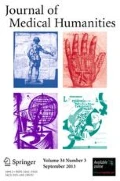Abstract
In “The Epidemiology of ‘Regrettable Kinship’: Gender, Epidemic, and Community in Todd Haynes' [Safe] and Richard Powers' Gain,” the author analyzes two contemporary cultural texts about women and environmentally-linked illnesses to rethink commonplace understandings of the relationship between gender, disease, and community formation. By reading these narratives side by side, Lynch is able to address difficult issues about gendered subjectivity and the fragile construction of collective political identity. While the female protagonists in the texts Lynch examines relate differently to their illnesses, both portray the ways in which women negotiate the potential and limitations of “illness communities.”
Similar content being viewed by others
REFERENCES
Brown, P., & Mikkelsen, E. J. (1990). No safe place: Toxic waste, leukemia, and community action. Berkeley, CA: U of California Press.
Beck, U. (1992). Risk society: Towards a new modernity. London: Sage.
Cartwright, L. (1998). Community and the public body in breast cancer media activism. Cultural Studies, 12(2), 117–138.
Dumit, J. (1997, November). Illness communities. Paper presented at meeting of the Center for the Study of Public Scholarship, Atlanta, GA.
Farrell, K. (1998). Post-traumatic culture: Injury and interpretation in the nineties. Baltimore: Johns Hopkins University Press.
Harris, C.B. (1998). The stereo view: Politics and the role of the reader in gain. Review of Contemporary Fiction, 18(3), 97–108.
Haynes, T. (Director). (1995). [Safe]. Sony Pictures Classics.
Haynes, T. (1995). Interview. Artforum, 33(10), 86–88.
Jameson, F. (1991). Postmodernism: Or the cultural logic of late capitalism. Durham, NC: Duke University Press.
Kroll-Smith, S., & Floyd, H. (1997). Bodies in protest: Environmental illness and the struggle over medical knowledge. New York: New York University Press.
Murphy, M. (2000). The elsewhere within here and environmental illness: Or, how to build yourself a body in a safe space. Configurations, 8(1), 87–120.
Naismith, G. (1998). Tales from the crypt: Contamination and quarantine in Todd Haynes's [Safe]. In P. Treichler, L. Cartwright, & C. Penley (Eds.), The visible woman: Imaging technologies, gender and science (pp. 360–387). New York: NewYork University Press.
pubs/ovarian.html}>.
Neilson, J. (1998). An interview With Richard Powers. The Review of Contemporary Fiction, 18(3), 13–23.
Powers, R. (1998). Gain. New York: Farrar Strauss & Giroux.
Proctor, R. (1995). Cancer wars: How politics shape what we know and don't know about cancer. New York: Basic Books.
Putnam, R. (2000). Bowling alone: The collapse and revival of American community. NewYork: Simon and Schuster.
Radetsky, P. (1996). Allergic to the twentieth century. New York: Little Brown.
Showalter,E. (1998). Hystories: Hysterical epidemics and mass media. NewYork: Columbia University Press.
Steingraber, S. (2000). Living downstream: An ecologist looks at the environment. New York: Addison-Wesley.
Triechler, P. (1999). How to have theory in an epidemic. Durham, NC: Duke University Press.
Tomatis, L. (1991). Cancer: Causes, occurrence and control. New York: Oxford University Press.
Author information
Authors and Affiliations
Rights and permissions
About this article
Cite this article
Lynch, L. The Epidemiology of “Regrettable Kinship”: Gender, Epidemic, and Community in Todd Haynes' [Safe] and Richard Powers' Gain . Journal of Medical Humanities 23, 203–219 (2002). https://doi.org/10.1023/A:1016894318355
Issue Date:
DOI: https://doi.org/10.1023/A:1016894318355


